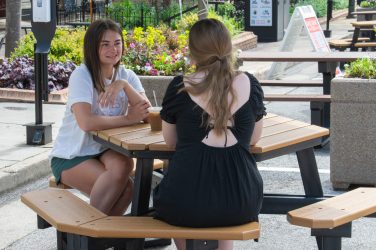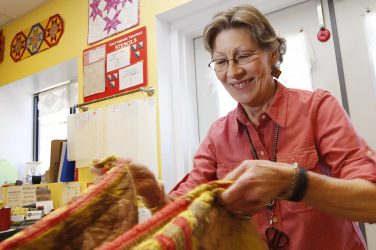https://vimeo.com/243305940
Mauli Desai, the culture editor at The Red & Black newspaper, spent the first nine years of her life wandering the flora of her Papa’s mango farm.
Two things came to life there, in the city of Vadodara, India: the story of a young girl and the servant ethos a mango farm taught her.
“Sometimes they were in bunches,” Desai said. “Other times, the mangoes were single, bright, yellow and curved, very feminine and strikingly beautiful. Sometimes they were fat or juicy or green. You never knew what you were going to get and I have always celebrated those differences.”
She has since left the mango farm behind, but Desai holds the lessons it taught close to her heart, making the golden fruit a key part to every birthday she has celebrated since her family moved to the United States.
“Each year I blow out my candles and think of those trees and the farm’s wide, open space. It was a special place,” Desai said.
Since moving away from her native country, Desai has celebrated with her family’s farm in mind for 10 consecutive years. Channeling the initial scenes of rich, unique fruits, Desai has developed a deep regard for diversity. She has parlayed that mindfulness into becoming one of the most successful desk editors at The Red & Black.
“I think our coverage hasn’t been this diverse for the culture desk in a really long time, at least since I’ve been here, if not ever,” said Nicole Sartain, the editor in chief of The Red & Black. “I think she’s gone above and beyond in her pursuit of fresh content.”
However, Desai’s achievements are somewhat of a rarity. According to the American Society of News Editors’ 2017 Diversity Survey, only 16.6 percent of journalists in United States newsrooms are minorities.
“It doesn’t surprise me at all, but I’m hopeful,” Desai said. “I really think the number of marginalized people joining the newsroom is growing. Whether it be other Indians, members of the LGBTQ community, or whoever, I’ve seen an increase in minorities pursuing journalism.”
Desai largely attributes this to vocal, minority journalists who have paved the way and served as role models to the younger generations.
For her, that paragon is Souad Mekhennet, a national security desk correspondent for the Washington Post. When Mekhennet came to the University of Georgia’s Grady College to be a keynote speaker at the 2017 McGill Symposium, Desai got the chance to witness proof that future journalistic success was a potential reality.
“Seeing her meant the world to me,” Desai said. “Seeing her, I saw a woman who came from a background that’s not always well represented in journalism. She faced the same problems in becoming a journalist that I have felt in my life.”
As an aspiring journalist, Mekhennet experienced much of the same familial and cultural backlash that Desai herself has had to deal with in her budding career.
“She had parents worried if she would have a stable income,” Desai said. “That’s exactly what my parents worry about. You don’t see a lot of people of Arab decent and Muslim background pursue journalism and people undermined her for it. I’m kind of afraid of the same thing.”
Despite her fears, Desai remains proactive. The need for more diverse coverage and courageous voices has outweighed any current and future adversity.
“As journalists who are obligated to the truth and the citizens, it’s our job to make readers feel a part of the newsroom,” Desai said. “It’s always been about the people and for the people.”
Only time will tell where Desai’s career takes her. But beyond professional success, Desai now dreams of warm summers venturing back to India, to stroll the fields of mango trees that serve as a constant reminder of the differences that make us special.
By Kristin Bradshaw






Show Comments (0)